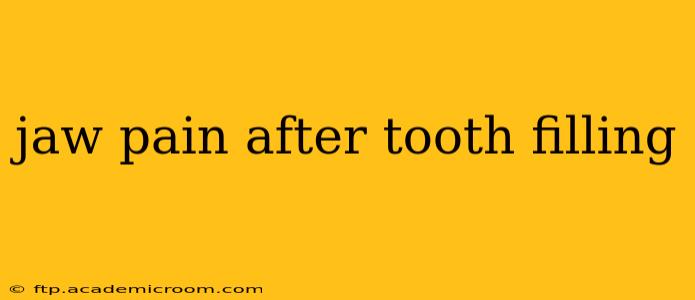Experiencing jaw pain after a tooth filling is a common concern, and understanding its causes and treatments can significantly alleviate worry and discomfort. This comprehensive guide will explore the potential reasons behind this issue, offering advice on when to seek professional help and how to prevent future occurrences.
What Causes Jaw Pain After a Tooth Filling?
Several factors can contribute to jaw pain following a tooth filling procedure. The most common causes include:
-
High Bite: If your bite is significantly altered after the filling, it can strain your jaw muscles and joints, leading to pain. This often happens when the filling is too high, causing your teeth to meet unevenly. This uneven pressure forces your jaw to work harder, resulting in discomfort.
-
Inflammation: The filling procedure itself can cause minor inflammation in the surrounding gum tissue and jaw muscles. This inflammation is usually temporary, but in some cases, it can lead to persistent pain.
-
TMJ Disorder (Temporomandibular Joint Disorder): While not directly caused by the filling, the procedure might exacerbate an existing TMJ disorder. TMJ involves the joints connecting your jaw to your skull. Stress, clenching, and grinding can contribute to TMJ, and a new filling might alter the bite enough to trigger pain in those already prone to TMJ issues.
-
Infection: Although rare, an infection at the filling site can also cause jaw pain. This usually presents with other symptoms, such as swelling, redness, and pus.
Is Jaw Pain After a Tooth Filling Normal?
Mild jaw discomfort or soreness for a day or two after a filling is considered relatively normal. Your jaw muscles may be slightly sore from the procedure, similar to muscle soreness after any minor procedure. However, persistent or severe pain, particularly if accompanied by other symptoms like swelling or fever, is not normal and warrants immediate attention from your dentist.
How Long Does Jaw Pain After a Tooth Filling Last?
The duration of jaw pain varies depending on the cause. Mild soreness should subside within a few days. If the pain is due to a high bite or inflammation, it may take a week or two to resolve. However, persistent pain lasting longer than two weeks indicates a more serious underlying problem and necessitates a dental checkup.
What to Do About Jaw Pain After a Tooth Filling?
-
Over-the-counter pain relievers: Ibuprofen or acetaminophen can help manage mild to moderate pain. Always follow the recommended dosage.
-
Warm or cold compresses: Applying warm or cold compresses to the affected area can provide temporary relief. Experiment with both to see which works best for you.
-
Gentle jaw exercises: Your dentist might recommend gentle jaw exercises to help relax your jaw muscles. Avoid strenuous activity that puts extra stress on the jaw.
-
Soft foods: Stick to soft foods for a few days to minimize jaw movement and strain.
-
See your dentist: If the pain is severe, persistent, or accompanied by other symptoms, make an appointment with your dentist immediately.
Can a Tooth Filling Cause Long-Term Jaw Problems?
While most cases resolve quickly, poorly placed fillings or untreated underlying conditions like TMJ can lead to long-term jaw problems. Regular dental checkups and addressing any jaw pain promptly are vital to prevent long-term complications.
How Can I Prevent Jaw Pain After a Tooth Filling?
-
Choose an experienced dentist: Selecting a qualified and experienced dentist is crucial to minimize the risk of complications.
-
Communicate openly: During the procedure, openly communicate any discomfort or unusual sensations to your dentist.
-
Follow post-procedure instructions: Carefully follow your dentist's post-procedure instructions regarding diet, oral hygiene, and pain management.
-
Address existing TMJ problems: If you have a history of TMJ disorder, discuss this with your dentist before the filling procedure.
This information is intended for general knowledge and does not constitute medical advice. Always consult with a qualified dental professional for diagnosis and treatment of any dental or jaw pain. Ignoring persistent jaw pain can lead to more significant problems later. Early detection and intervention are key to resolving the issue effectively.
